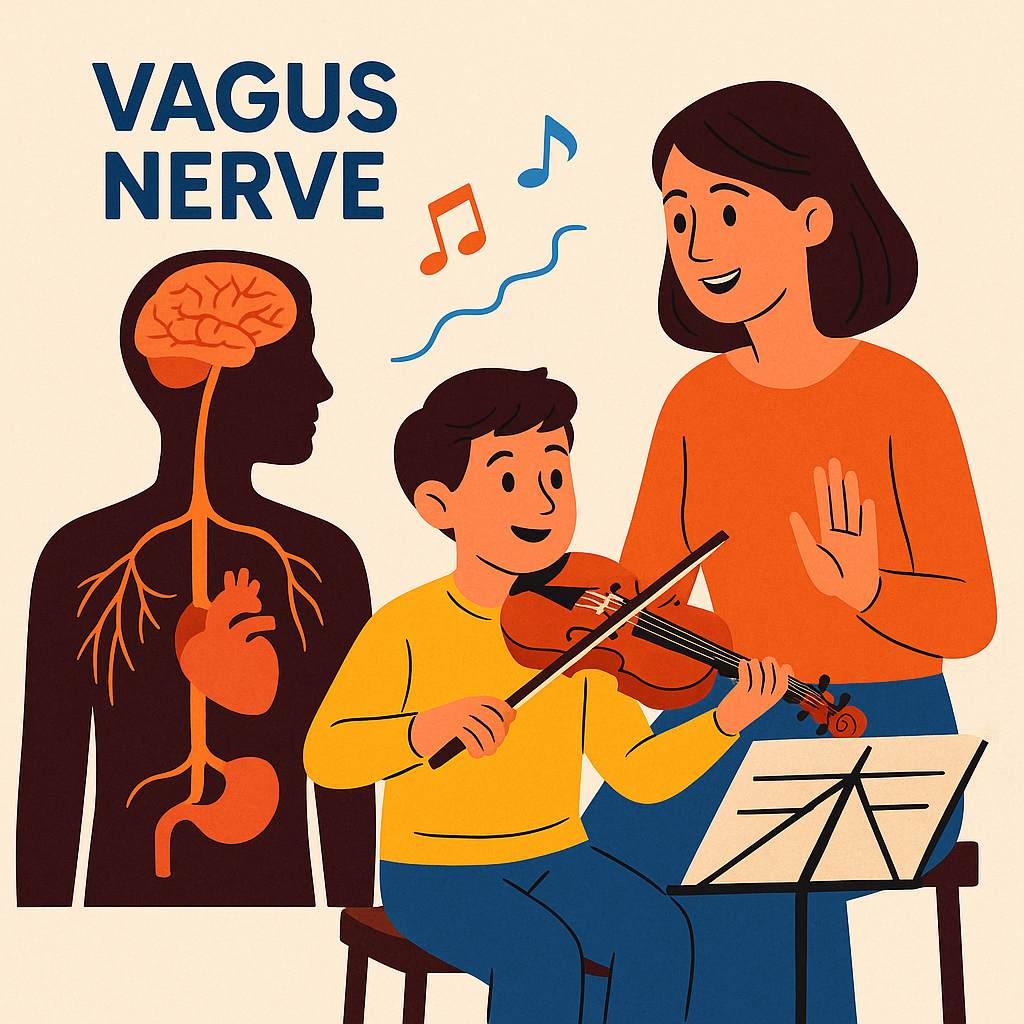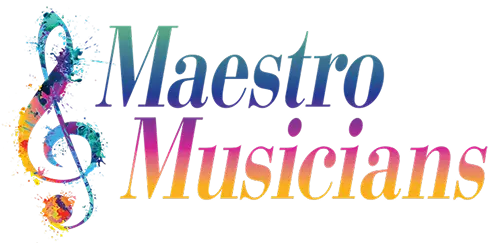
How Music Helps Children Feel Safe, Connected, and Ready to Learn: A Polyvagal Perspective
At Maestro Musicians, we’ve always believed that music lessons are about far more than learning notes on a page. They are about connection. They are about the bond between teacher and student. They are about giving children a space to feel seen, safe, and supported so they can grow — musically and emotionally.
Recently, writer Maria Popova explored a powerful idea from neurobiology that beautifully aligns with our mission: Polyvagal Theory. Developed by psychiatrist Dr. Stephen Porges and expanded clinically by therapist Deb Dana, this framework explains why supportive relationships — including teacher-student relationships — are essential for healthy development.
It turns out that music lessons don’t just teach music.
They literally help shape the nervous system.
The Vagus Nerve and the Biology of Safety
The body’s longest nerve — the vagus nerve — runs from the brain through the heart, lungs, and stomach. It controls everything from digestion to mood. Polyvagal Theory teaches us that this nerve has two primary branches:
-
Dorsal vagus – responsible for shutdown, collapse, and “checking out” when a child feels overwhelmed or unsafe.
-
Ventral vagus – responsible for connection, communication, curiosity, and emotional regulation.
When children are in a ventral vagal state, they are:
-
calm
-
open to learning
-
emotionally flexible
-
able to listen and express themselves
-
able to enjoy connection with others
This is the biological foundation of healthy growth, exploration, and creativity — the very qualities that music awakens.
Safety Is the First Step to Learning
Psychologist Deb Dana writes:
“Story follows state — the mind narrates what the nervous system knows.”
In simple terms: children learn best when they feel safe.
For many kids today — surrounded by academic pressure, overscheduled days, and digital noise — their nervous systems spend too much time in a stress-based state. The result can be:
-
perfectionism
-
shutdown
-
frustration
-
difficulty focusing
-
hesitancy to try new things
This is where the right music teacher makes all the difference.
At Maestro Musicians, our teachers are trained not only as musicians but as mentors. Their kindness, patience, and attunement help activate the ventral vagal system — the biological pathway of connection — allowing children to relax into learning.
Music as Co-Regulation
Polyvagal Theory uses a beautiful term: co-regulation.
It means that our nervous systems are shaped and soothed through safe relationships.
Music lessons are rich with opportunities for co-regulation:
-
A warm hello at the door
-
A patient teacher guiding a difficult passage
-
Laughing together over a silly rhythm
-
Celebrating a breakthrough
-
Breathing together before beginning a piece
-
Side-by-side listening at the piano or music stand
In every lesson, a child’s nervous system is learning:
“I can be myself. I can take risks. I can grow here.”
This sense of safety allows children to practice two skills essential for life:
-
Emotional regulation — managing frustration, self-soothing, staying present
-
Reciprocity — the back-and-forth rhythm of communication, listening, and responding
These skills don’t just help children become better musicians.
They help them become more resilient human beings.
When Early Experiences Create Barriers
Polyvagal Theory acknowledges that not every child begins life with strong experiences of co-regulation. Some children:
-
fear making mistakes
-
withdraw under pressure
-
shut down when something feels “too hard”
-
expect criticism instead of encouragement
A meaningful teacher–student relationship can gently transform these patterns.
At Maestro Musicians, we have witnessed children who arrive timid or discouraged slowly blossom into confident, expressive young people. Not because they “work harder,” but because they finally feel emotionally supported.
The nervous system learns through experience. When a child feels safe, curiosity returns. When curiosity returns, learning blooms.
Music Lessons as a Pathway to Ventral Safety and Joy
The ventral vagal system — the system of connection — is activated by:
-
eye contact
-
warm tone of voice
-
shared rhythm
-
gentle encouragement
-
collaborative problem-solving
-
joyful experiences
What is music, if not shared rhythm, warm expression, and joyful connection?
A music lesson naturally engages the pathways that help a child feel regulated, attuned, and confident. This is one reason why parents often tell us:
-
“My child’s mood improves after lessons.”
-
“She’s calmer the rest of the day.”
-
“He becomes more confident at school.”
-
“This is the one activity where my child truly feels connected.”
Music touches the nervous system — not just the mind.
Why Maestro Musicians’ Mission Aligns With the Science
Everything Polyvagal Theory teaches reinforces what we have believed from the beginning:
Children thrive when music becomes a relationship, not just an activity.
At Maestro Musicians:
-
We pair children with teachers who are warm, patient, and attuned.
-
We focus on mentorship and connection.
-
We believe in progress, not performance anxiety.
-
We know that emotional safety leads to musical growth.
-
We view music as a tool for communication, self-expression, and human connection.
- Our high standards exist with the ultimate goal of personal growth, achievement, and fulfillment.
Music becomes a sanctuary — a nourishing place where children can slow down, breathe, and experience the joy of being cared for by a trusted adult.
A Final Thought
Polyvagal Theory reminds us that “connectedness is a biological imperative.”
Children need spaces where they can feel safe, supported, and inspired.
We are honored that so many families trust Maestro Musicians with this sacred part of childhood. Through music, through mentorship, and through warm human connection, we strive to give every child the emotional foundation they need to thrive — not just as musicians, but as whole people.
